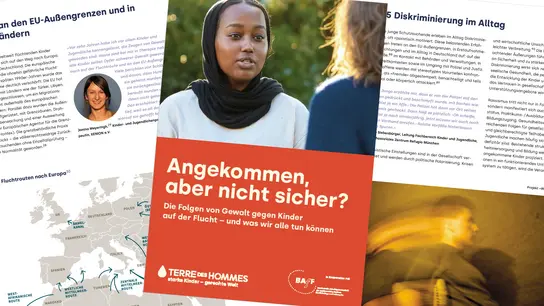Refugee children and young people are increasingly experiencing severe violence before, during, and after their flight – from pushbacks and sexual violence to restricted access to education, healthcare, and safe accommodation. Reforms to the Common European Asylum System (CEAS) are exacerbating the situation of (un)safe arrival.
The report by Terre des Hommes , in cooperation with the Federal Association of Psychosocial Centers for Refugees and Victims of Torture (BAfF eV), documents the consequences of violence against refugee children for their mental health, their rights, and their participation in Germany. The report provides practical recommendations, particularly for educational and social workers, and offers valuable background information to enable collaborative efforts to improve the safety, protection, and participation of refugee children.
Report »Arrived, but not safe?«
The report documents the consequences of violence against refugee children for their mental health, their rights and participation in Germany.
DownloadWhat can I do as a volunteer, teacher, or social worker?
Volunteers, teachers, educators, social workers, and professionals in youth services, medical and psychosocial care, and refugee accommodations are often important contacts for young people. They can make a significant contribution to their safety, protection, and participation.
Children are independent legal entities with individual needs, experiences, and perspectives. It is therefore important to familiarize oneself with children's rights and their implications for refugee minors, to discuss this within the team, and to actively consider these rights in practice.
Children need safe spaces and consistent protection from violence and neglect. Teachers and professionals must recognize physical, psychological, and sexual violence, take it seriously, and act accordingly. Violence prevention and child protection policies in institutions must not only exist formally but must be actively practiced and continuously reviewed. Relationships based on trust and stability are a fundamental protective factor for children with refugee experiences. Building and maintaining these relationships requires time, attention, and a trauma-informed approach.
Teachers and professionals play a crucial role in recognizing psychological distress and referring young people to support services. Information about available resources and assistance should be readily available, even for those with uncertain immigration status. Early signs of trauma-related disorders must be taken seriously. Psychological reactions can be understood as coping mechanisms in highly stressful situations. Training in trauma-informed practices can help develop appropriate responses.
An important contribution lies in enabling effective participation. Refugee children and young people should be involved in decisions that affect them. Teachers and professionals can create and promote age-appropriate participation formats in which young people can express their opinions without fear and experience self-efficacy.
Volunteers, teachers, and professionals are called upon to confront discrimination and racism – both in their interactions with refugee families and within institutional contexts. This means reflecting on their own attitudes and professional structures, identifying racist or discriminatory incidents, and taking action against them. In this way, they can assume an ally role, support empowerment, and strengthen children and young people.
Much can be achieved when various stakeholders exchange ideas with each other in local networks: for example, schools, healthcare, youth services, volunteers, and migrant self-organizations. Together, gaps can be identified, transitions can be better managed, and resources can be pooled to intervene more effectively.
Teachers and professionals play a crucial role: they witness systemic failures, resource deficiencies, and violations of human and children's rights. They can contribute these experiences to professional, public, and political debates. Their expertise helps initiate improvements and demand human rights-based standards. Even though individual agency is limited, attitude, knowledge, and commitment can all contribute to empowering refugee children.
Further information and practical tips
Brochure : Trauma-sensitive and anti-discrimination work with refugees. A practical guide (BAfF, 2025)
Brochure : Powerful Narratives – What We (Don't) Tell Each Other. On the connection between violence, stress, and trauma in the context of displacement (BAfF, 2025)
Toolbox : Trauma – What to do in an emergency? This toolbox provides initial guidance, exercises, and information on the topic of trauma. It is aimed at first responders and professionals working with children and adolescents in challenging situations. (REFUGIO Thüringen, 2024)
Toolbox : A treasure trove of methods for working with children and young people , including resource-oriented exercises from psychosocial work (Save the Children, 2023)
Comic handbook (with exercises) for professionals and activists on dealing with stress, challenging situations and conflicts: “ I can do this! ” (Libereco, 2024)
Report: No place for children. Perspectives of young asylum seekers on accommodation ( Terre des Hommes , 2024)
Report : This is not life. Perspectives of children and young people in refugee accommodations (UNICEF & DIMR, 2023)
Report : Living in a box. Psychosocial consequences of living in collective accommodations for refugee children (BAfF, 2020)
E-learning program for teachers and social workers who work with refugee, traumatized children and young people: trauma-sensibel.de
Information brochure for young people on school and the right to education in German and Ukrainian (BuMF, 2022)
Handbook for educational professionals: Healing Classrooms. Safe spaces for collaborative learning (IRC, 2024)
Brochure : The asylum procedure. Your rights, your prospects explained for unaccompanied minors in 7 languages: German , Arabic , French , English , Russian , Spanish , Persian/Dari , Turkish (Federal Office for Migration and Refugees & Federal Ministry of Education and Research of Lower Saxony, 2023)
Information collection : Asylum procedures for unaccompanied minor refugees (BuMF, 2025)
Information collection : Deportations from schools, daycare centers and businesses (information portal basiswissen.asyl.net , 2024)
Guidance : Information on the pedagogical approach to the suspension of family reunification for beneficiaries of subsidiary protection. Family reunification suspended – hopes dashed – How can professionals effectively support unaccompanied minors now? (Federal Office for Migration and Refugees, 2025)
Brochure : Solidarity Makes You Strong. A Guide for Young People on Dealing with Discrimination (For Young People, German) (Gladt, 2019)
Directory : Working with young refugees in a way that is critical of racism and empowering (BuMF, 2022)
Guide : What to do after a racist attack? Recommendations for victims in 16 languages (VBRG, 2024)
Guidelines : Right-Wing Violence – A Challenge for Schools. Guidelines for professionally dealing with victims of right-wing violence in the school context (Victim Perspective – Solidarity Against Racism, Discrimination and Right-Wing Violence eV, 2020)
Guidelines : Closing the “Racism Education Gap”! Options for Action in the School Context (LIFE Education Environment Equal Opportunities eV, 2025)
demands
After arriving in Germany, many children and young people seeking protection continue to face discrimination, violence, uncertainties surrounding their asylum status, and limited access to the education and healthcare systems. For these young people, this means a continuation of trauma instead of arriving in safety. Coping with the consequences of this violence and preventing further trauma requires more than individual support. It requires structural changes, child- and youth-friendly conditions, and safe spaces that enable a life after violence, flight, and displacement.
Based on our research, we formulate the following demands:
1. Significantly expand legal entry options. Current border control policies ignore the fact that there are hardly any legal escape routes for fleeing in emergencies. This forces people to choose dangerous, “irregular” routes. Humanitarian admission programs, resettlement, and simplified family reunification procedures, especially for unaccompanied minors and siblings, must be urgently expanded to protect children and young people.
2. Provide reliable prospects for all children and young people seeking protection to remain in the country – regardless of their country of origin or residency status. Uncertainty and fear of deportation or asylum procedures retraumatize and hinder integration. Safety and protection are prerequisites for healthy development. Therefore, asylum procedures must be consistently geared towards the protection of refugee children and young people – which, unfortunately, is often not the case in practice.
3. Accommodation must be non-violent, child-friendly, and decentralized. Many refugee children and young people report violence, neglect, and a lack of protection in their accommodations. As a preventative measure, all accommodations must be required to have functioning and regularly reviewed concepts for violence prevention and child protection. Children must not live in collective accommodations for months or years. They need privacy, stability, access to support, and educational and psychosocial services.
4. Protection from discrimination and trauma-informed professionals. Exclusion, institutional racism, and lack of access to health, education, and other children's rights are forms of structural violence from which children and young people must be effectively protected. This also requires a greater number of interdisciplinary trained professionals who are sensitive to discrimination and trauma in youth services, schools, healthcare, and the justice system.
5. Ensure needs-based and comprehensive psychosocial care. Access to psychosocial and therapeutic support must not depend on residency status. Low-threshold and free services for children and families are needed, as well as sustainable funding for specialized facilities (e.g., psychosocial centers) by the federal and state governments. Language interpretation in therapy and counseling must be enshrined in law and publicly funded. Systematic procedures for assessing needs (in schools, daycare centers, and accommodations) with clear referral pathways are necessary; deportations despite documented mental illness must be prevented.
6. Guarantee access to education and childcare. Daycare centers, schools, vocational training institutions, and universities must be open regardless of residency status. Bureaucratic hurdles and a lack of places must not result in children being out of school for months. Schools need resources, professional development and concepts for trauma-informed teaching, as well as flexible learning formats, school social work, and support services to prevent school dropouts.
7. Strengthen participation and opportunities for self-efficacy. Children and young people who have experienced violence and displacement need spaces where they can express themselves, make their voices heard, and experience self-efficacy. The right to participate in decision-making must be consistently implemented. Targeted support for empowerment programs (e.g., peer projects, creative group formats, or leisure activities) is needed to strengthen self-confidence and social participation.
Your contact person

Anna Weber
Speaker for the Germany and Europe program

EU funding
The research and report were co-financed by the Asylum, Migration and Integration Fund of the European Union.

